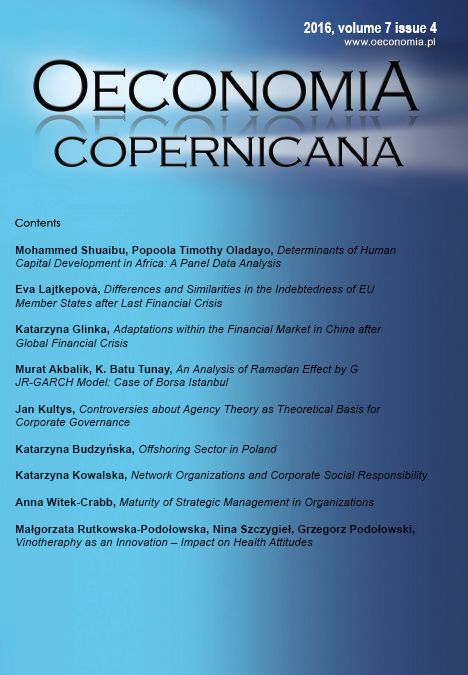CONTROVERSIES ABOUT AGENCY THEORY AS THEORETICAL BASIS FOR CORPORATE GOVERNANCE
CONTROVERSIES ABOUT AGENCY THEORY AS THEORETICAL BASIS FOR CORPORATE GOVERNANCE
Author(s): Jan KultysSubject(s): Economy, Supranational / Global Economy, Micro-Economics
Published by: Instytut Badań Gospodarczych
Keywords: corporate governance; agency theory; stewardship theory; team production theory; shareholder primacy model; director primacy model
Summary/Abstract: The issue of corporate governance is being taken up by different branches of science. Particular views on the nature and goals of a firm, as well as on corporate law, determine various approaches to the issue. The ongoing debate on corporate governance is being stimulated by notorious scandals and economic crises. The agency theory (prevailing today), which assumes egoism and pursuit of one’s own interests, forms the basis for shareholder primacy model, while team production theory forms the basis for director primacy model. Stewardship theory, which assumes convergence of management’s and stakeholders’ interests, may be competing or complementary towards the agency theory, depending on situation. According to management theory, efficient management requires law regulation of managers’ status. This paper is aimed at presenting controversies about traditional agency theory as theoretical basis for corporate governance, as well as at discussing other perspectives on the issue, which are extensions of the traditional theory or are based on substantially different premises. The analysis shows that going beyond agency theory allows for better understanding of the whole range of models of corporate governance as well as of the changes that are being proposed in the area. The method utilized in this paper is descriptive and comparative in character.
Journal: Oeconomia Copernicana
- Issue Year: 7/2016
- Issue No: 4
- Page Range: 613-634
- Page Count: 22
- Language: English

